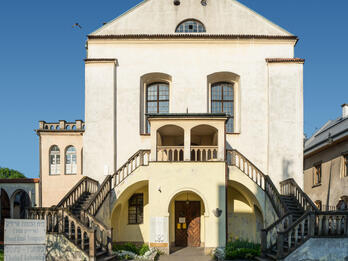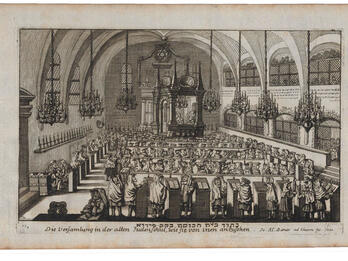Me’irat ‘enayim (Light of the Eyes)
Lo! I, the insignificant Joshua Falk, son of my Master, my father, the honorable R. Alexander ha-Kohen of blessed memory, was once young and am now aged (Psalms 37:25), and all my life I grew up among great men and delighted in the study of the Almighty’s Torah, and I despised the world’s perverse vanities. In the days of my youthful exuberance, I studied under my teacher and master, our illustrious teacher R. Isserles of blessed memory, and after him, I entered the sanctum of my teacher and master, the great chief, our teacher R. Solomon Luria of blessed memory, each of whom left a legacy of blessing for the numerous and great disciples whom they cultivated and the works they composed. We have merited to experience the illumination of several of these, which have been disseminated among Jewry, while others still remain concealed from our sight. May it be God’s will that we merit the benefit of their illumination likewise! I dwelt continually in their shade and perceived their path before me; I poured water upon their hands and learned from their Torah, licked the dust of their feet and thirstily drank of their waters [see m. Avot 1:4]. Their allotted fare [see Proverbs 30:8] was delightful to me—the mere dry bone that fell to my lot—and their mode of reasoning became my own. And my soul yearned to remain in the house of the Lord throughout my life, to draw close to the labor of study and increase the number of worthy disciples within my sphere of influence. I desired that my feet should stand in proximity to great men and that the truth might not elude me to teach the Jewish people the correct path. This had ever been my prayer from the days of my youthful precocity until I attained old age, and the Almighty heard my voice. And ever since I set out to purify myself, He assisted me. I merited to lead various communities and to establish a Torah academy in the public arena. My speech distills for them like the dew and the rain showers [see Deuteronomy 32:2]. And together with my students, I descended into the depths of the talmudic ocean, turning it into a smooth path for us. Furthermore, I placed on permanent record all my novellas on the tractates, with divine assistance, at the time when I studied with them. There were books upon fourteen tractates in all, and, with divine assistance. However, in my many sins, they were separated from me during the fire, those scrolls with the explanations. Since then, I have been turning this way and that to explore and seek out the correct path for me to follow. I chose to study and teach with select rabbis the halakhot of the Rif [Isaac Alfasi (1013–1103)], Ran [Nissim of Girona (1320–1376)], Mordechai [ben Hillel (1250–1298)], Rosh, and the Turim, and to examine each of these in its fissures and cavities, and to compose commentaries to them all. And upon seeing the many hardships imposed upon the rabbi leading a community—and appreciating that ruling on halakhah (especially for one following the aforesaid path) requires a clear mind, my plea to the Lord, Who has shepherded me was to grant me the merit of having a study house, so that I should not be desolate [see Job 3:7], and to empower me to maintain esteemed rabbis therein, before whom I would lay out daily offerings in appropriate sequence, early in the mornings and by night.
And even before I called upon Him, the Almighty heard my prayer, and induced my father-in-law, the ruler and nobleman, head and leader of the community of Lvov and its environs, whose name was renowned in the gates [see Proverbs 31:23], R. Israel ben Joseph, of blessed memory, to speak comfortingly to me, and he said to me: “Here is a meritorious deed that has fallen to my lot. Seize it, and I shall stand at your right hand and maintain worthy students on your behalf at your behest!” Thus he declared and kept his word—and he was my guiding light [see Numbers 10:31]. And he gave me a stone house built like a fortress, consisting of lower, second, and third stories plus attics, for droves upon droves to gather there, and to hang upon it the shields of the mighty authorities [see Song of Songs 4:4]. Accordingly my heart was glad and my innards rejoiced (Proverbs 23:16) that I would not have to depart from the tent [of Torah; see Exodus 33:11] even if I were called upon by the large community to exercise leadership. I made a vow and fulfilled it, and turned my design from theory into practice, closeting myself with students who attended early in the morning and late at night, despising worldly pleasures. And we occupied ourselves with the Talmud and the aforesaid poskim [halakhic decisors], with a view adequately to resolve all problematic issues in accordance with what the Almighty has directed us from His heavenly abode. And I learned much Torah from my teachers, and my innards became altered, as it were, through my students. I further turned my attention to the Bet Yosef, to ascertain whether it was adequate for our generation, and found that, due to our weak understanding, we do not fulfill our obligations by [studying] it, for several reasons:
- He composed it in a manner commensurate with the breadth of his intellect, his mental clarity, and great expertise, and thus he combined the language of the Mishnah, Gemara, decisors’ statements, and responsa pertaining to a particular law and commented on them all together, so that it is hard for anyone studying it to obtain a clear picture, from its jumbled-up words, of the law in question and what he needs to know.
- The master, because of his abundant sharpness and expertise, omitted explanations of several matters, which remain a closed book to most of our contemporaries studying it—specifically in the Tur’s Ḥoshen mishpat, which contains laws on monetary matters, concerning which our sages declared [b. Bava Batra 175b]: “One wishing to become wise should occupy himself with civil laws, which constitute an important discipline of the Torah”—and yet he abridged greatly in places where he needed to elaborate in his explanations.
- The master raised difficulties in several instances with the decisors’ statements, particularly those of the Tur, contradicting their words and treating them as erroneous—and occasionally leaving them open “for further investigation”—yet upon thorough investigation into the relevant topic, it appears to me that their statements are correct.
- The Bet Yosef did not examine the Tur’s statements with sufficient care, and I have already written that someone examining them carefully will see that numerous allusions are contained therein to matters mentioned by Tosafot, the Rosh, and other commentators and authors. Now what caused this problem for the Bet Yosef was that, from his youth, his primary study consisted of the writings of the Rif [Isaac Alfasi (1013–1103)] and Maimonides, whose rulings are followed in their own lands—and he merely attached his work to that of the Tur because, included within it, are many laws and opinions not mentioned by the authors preceding him, as the Bet Yosef mentions in his preface.
- Frequently, through haste or the master’s ingenuity, he offered explanations which in my humble opinion do not accord with the truth, as I shall demonstrate, God willing, both small and great. And again, this has ramifications in the emergence of laws not in line with the general consensus.
Translated by
.
Credits
Joshua Falk, “Me’irat ’eynayim (Light of the Eyes)” (manuscript, Lvov, 1606). Published as: Joseph ben Ephraim Karo, Shulḥan ‛arukh mi-tur Ḥoshen ha-mishpat ‛im ha-be’ur Me’irat ʻEnayim, with commentary by Joshua ben Alexander Falk (Berlin: Bi-defus Barukh Bukh Binder, 1717), pp. 3–4.
Published in: The Posen Library of Jewish Culture and Civilization, vol. 5.




